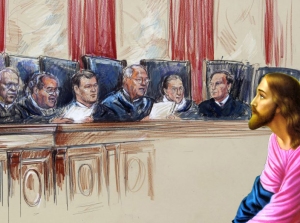 It’s not every day that the US Supreme Court gets an amicus brief from their Lord and Savior. Even more surprising is that conservative Christian justices would ignore Jesus’ opinion so completely, as was the case in their Town of Greece, NY v. Galloway decision of May 2014.
It’s not every day that the US Supreme Court gets an amicus brief from their Lord and Savior. Even more surprising is that conservative Christian justices would ignore Jesus’ opinion so completely, as was the case in their Town of Greece, NY v. Galloway decision of May 2014.
My strong suspicion is that Jesus has no immediate plans of coming back to Earth, otherwise he couldn’t have picked a better time to appear as a surprise witness at the Supreme Court reminding the “Christians” that Christian public prayer is an oxymoron, the very definition of “UN-Christian.”
When you pray, you shall not be as the hypocrites, for they love to stand and pray in the synagogues and in the corners of the streets, that they may be seen by men. Most certainly, I tell you, they have received their reward. —Matthew 6:5
But wait, Jesus isn’t done yet:
But when you make your prayer, go into your private room, and, shutting the door, say a prayer to your Father in secret, and your Father, who sees in secret, will give you your reward. —Matthew 6:6
Pretty clearly the Son of God and King of Kings says only pray in “your private room” where you’re not “seen by men.”
But if Jesus says you can’t pray at your city council meeting, where else could you possibly pray? This time Jesus leads by example:
But he would withdraw to desolate places and pray. —Luke 5:16
In every gospel, Jesus heads off to the desert or the mountain to pray. That’s fine for him, but he never quite imagined his followers would eventually number in the billions. It really is impractical to start your governmental meeting with a quick trip to the desert.
The “Ceremonial” Argument
The 5-4 decision, by and for conservative Christians, claims that these prayers are acceptable since they are “ceremonial” and “part of the Nation’s heritage and tradition.”
As is often the case, these religious prayers or governmental references to God are claimed to be harmlessly “ceremonial” or “patriotic.” But yet at the same time the prayers are fiercely defended by the religious majority. So which is it? Are they negligibly religious or deeply meaningful and important to the believers?
It is just way too convenient that on this one issue these prayers and phrases are decreed to perfectly straddle the line between meaningful and meaningless. Meaningful enough to continue, but not meaningful enough for non-believers to complain about.
To get a sense of how “ceremonial” the Greece, NY prayers were, here are a few quotes from the prayers that were featured in Justice Kagan’s dissent:
Prayers evoking “the saving sacrifice of Jesus Christ on the cross,” “the plan of redemption that is fulfilled in Jesus Christ,” “the life and death, resurrection and ascension of the Savior Jesus Christ,” the workings of the Holy Spirit, the events of Pentecost, and the belief that God “has raised up the Lord Jesus” and “will raise us, in our turn, and put us by His side.”
The amicus brief from the Freedom from Religion Foundation reminds us that the American “traditions” of miscegenation and sodomy laws had been on the books for a ling time, but that “a longstanding practice can simply be a longstanding violation.”
“We do it that way because we’ve always done it that way” leads to this reasoning from Warren Burger’s 1986 (!) Bowers v. Hardwick opinion:
[H]omosexual conduct ha[s] been subject to state intervention throughout the history of Western civilization. Condemnation of those practices is firmly rooted in Judeao-Christian moral and ethical standards. . . . To hold that the act of homosexual sodomy is somehow protected as a fundamental right would be to cast aside millennia of moral teaching.
Religious Lack of Empathy
Why then are so many (though definitely not all!) Christians unwilling or unable to imagine how it would feel to be a religious outsider when public prayers are being said?
With any religion, just like with any sports team, there is an in-group who shares your core beliefs, and an out-group who doesn’t. What always amazes me is the callous attitude some believers have about the effect of their public prayers on their fellow citizens who don’t share their religious beliefs. What kind of religion does not teach and foster empathy, the ability and willingness to put yourself in someone else’s shoes and see the world from their perspective? Either that message just does not get through to some congregants, or some churches don’t see it as a priority.
The Massachusetts Supreme Court ruled this month that the phrase “under God” could stay in the Pledge of Allegiance when public school students are told to recite it. Again, their attitude toward these children is fairly callous: “Participation is entirely voluntary,” as if to assume there is no downside for a child who sits out the Pledge of Allegiance on religious or constitutional grounds.
Which brings us to Bible Funmentionables’ Core Principle #3: If your religion makes you a better person—more empathetic, understanding and accepting of others—then great! If your religion allows or encourages you to be hateful, self-righteous, and intolerant of your fellow human beings who are just trying to get along on this planet, you may have missed the point of your religion entirely.
Michael Morris is the author of Bible Funmentionables: A Lighthearted Look at the Wildest Verses You’ve NEVER Been Told!, which features all of the shocking and hilarious verses that your minister, rabbi, or charismatic cult leader is afraid to preach.
